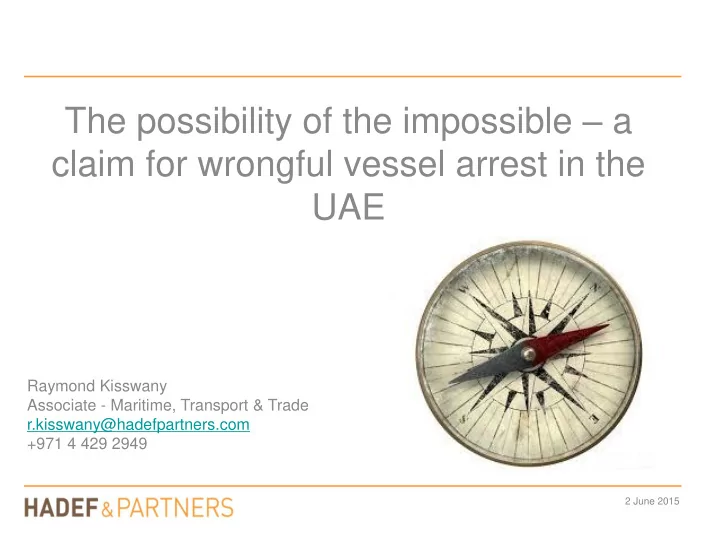

The possibility of the impossible – a claim for wrongful vessel arrest in the UAE Raymond Kisswany Associate - Maritime, Transport & Trade r.kisswany@hadefpartners.com +971 4 429 2949 2 June 2015
Introduction What is a vessel arrest? Why arrest a vessel? 2 June 2015
Maritime Debts A vessel can only be arrested to obtain security in respect of maritime debt as set out in UAE Federal Law No. 26 of 1981 concerning the Commercial Maritime Law (“ CML ”). “Maritime debt” is defined as a list of causes pursuant to CML Article 115(2): (a) Damage caused by the vessel by reason of a collision or otherwise. (b) Loss of life or personal injuries occasioned by the vessel and arising out of the use thereof. (c) Assistance and salvage. (d) Contracts relating to the use or exploitation of the vessel under a charterparty or otherwise. (e) Contracts relating to the carriage of goods under a charterparty, bill of lading, or other documents. (f) Loss of or damage to goods or chattels being carried on board the vessel (g) General average. (h) Towage or pilotage of the vessel. (i) Supplies of products or equipment necessary for the utilization or maintenance of the vessel, in whichever place the supply is made. (j) Construction, repair or fitting out of the vessel, and costs of it being in dock. (k) Sums expended by the master, shippers, charterers or agents on account of the vessel -or on account of the owner thereof. (l) Wages of the master, officers and crew, and other persons working on board the vessel under a contract of maritime employment. (m) A dispute as to the ownership of the vessel. (n) A dispute in connection with the co-ownership of the vessel, or with the possession or use thereof, or with the right to the profits arising out of the use thereof. (o) A maritime mortgage 2 June 2015
Vessel Arrest HOW TO ARREST A VESSEL: A Power of Attorney (“ POA ”) is always required by UAE advocates. 1. 2. A claimant must file an arrest application in the UAE Court together with all supporting documents 3. Countersecurity 4. Substantive proceedings 2 June 2015
Wrongful Vessel Arrest CONSIDER THE FOLLOWING: 1. ABC Shipping Co owns 100% of the shares of DEF Co and XYZ Co. 2. DEF is the registered owner of Vessel 1 . 3. XYZ is the registered owner of Vessel 2 . Dispute arises between GHI (“Charterer”) 4. ABC SHIPPING Co. and Vessel 1 and owners DEF. DEF Co. XYZ Co. Vessel 1 Vessel 2 2 June 2015
Basic Legal Principles Beneficial Owner vs. Registered Owner Sister Ships vs. Associated Ships Arresting “Non - Guilty Ships” 1952 Arrest Convention and 1999 Arrest Convention CML Article 116(1) “ [a]ny person seeking to recover the debts ... may arrest the vessel to which the debt relates, or any other vessel owned by the debtor if such other vessel was owned by him at the time the debt arose ”. 2 June 2015
Hurdles to Wrongful Vessel Arrest No UAE statutory definition of what constitutes a wrongful vessel arrest; and Virtually no case law dealing with this particular legal issue. Note: UAE legal system is not precedent based and case law, though used as a guideline, is not binding. 2 June 2015
Harm Caused Civil Code Article 282 states “ [a]ny harm done to another shall render the doer thereof … liable to make good the harm” . Duty of Care Elements required to establish a party’s liability for the harm that party has done. 2 June 2015
Direct vs. Indirect Causation Civil Code Article 283 states “ (1) harm may be direct or [indirect]; (2) if the harm is direct, it must unconditionally be made good, and if it is [indirect], there must be a wrongdoing or a deliberate act or the act must have led to the harm” . How UAE Courts determine direct vs. indirect causation? In a vessel arrest, who is the direct causer of harm? 2 June 2015
Direct causation always prevails Civil Code Article 284 states “ [i]f the same harm is caused by a direct actor and an indirect actor, judgment shall be against the direct actor” . Dubai Court of Cassation ‘ [i]f two acts combine to cause damage, one of them direct and the other indirect, then the basic rule is that compensation will be payable by the doer of the direct act .’ 2 June 2015
Thank you. Q&A… Raymond Kisswany Associate Maritime, Transport & Trade r.kisswany@hadefpartners.com +971 4 429 2949 2 June 2015
Recommend
More recommend